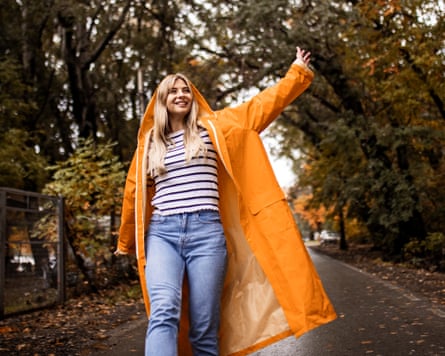Since the clocks changed, a damp, dark blanket settles over York from about 5pm – and it’s brilliant; the perfect excuse to stay in. I love every quiet corner of home: my armchair, angled for a perfect view of bird goings-on and bleak skies outside; my marshmallowy bed; the sofa, stacked with blankets; the kitchen (I don’t cook, but it’s where snacks live). What could be nicer than sinking into the stifling embrace of multiple heated throws as a jacket potato crisps up in the oven and I succumb to a smorgasbord of good winter telly? Why would I ever move?
Me and everyone else. Right? We’re sleepmaxxing and soup-making in our slippers, sparking up fairy lights and enthusiastically appropriating hygge and gezellig (Dutch for cosy). We’re sharing memes on the thrill of someone else cancelling social plans before we’re forced to and proclaiming our Jomo. It’s natural to retreat in winter: we’re animals. But it’s not just a seasonal phenomenon now, and I’m conscious I need, and maybe you also need, to get a grip and go out.
Staying in got too easy. We can get food – anything we want, actually – delivered; we can exercise and socialise. We can amuse ourselves, endlessly, indoors: smartphones and streaming mean kids today will never know the crushing tedium of 1980s Sunday nights, funereally soundtracked by Harry Secombe’s baritone. Home – if we’re lucky – feels like a haven, a feeling compounded by Covid (which reframed staying there as a civic virtue) and even if we’re not lucky, it’s cheaper, during a cost-of-living crisis. But as the urban policy specialist Diana Lind wrote in the Washington Post in August, “The cheapest and easiest option – staying in – is costing us something else.”

Describing this “quiet descent into hermitage”, Lind set out statistics, symptoms of a global “Great Retreat”: Americans spend 99 more minutes on average at home per day than they did in 2003 (124 minutes for 15-24-year-olds); only 30% spend time socialising and communicating in an average day, down from 38% in 2014. Young people in the UK, Australia and South Korea are socialising less, too. But everyone’s doing it: I was recently chilled to read, in the American writer Laura Fenton’s newsletter, how an affluent homeowner she had interviewed explained they had filled their garden with fun stuff: “So the kids don’t have to go down the street to the park to go throw a ball around or play.”
Not going out is bad for us for selfish reasons: social isolation increases our mortality risk (meta-analysis in 2010 estimated lacking social connection is comparable to smoking 15 cigarettes a day). It’s also bad in less concrete ways, I think. As academic Mark Dunkelman explained to the Atlantic earlier this year, the Great Retreat doesn’t stop us seeing our intimates, or connecting digitally, but it means we’re less exposed to the “middle circle” – acquaintances, neighbours, fellow citizens. That means we experience less complexity, challenge and conflict; we have fewer surprises; our corners don’t get rubbed off by contact with life beyond the living room. Speaking for myself, I know frictionless hygge makes me boring.
It’s bad for communities, too, because it stops us seeing, perhaps even caring, what’s going on. If you don’t take your kids to the park, a broken swing is an abstract problem and it’s hard to muster much indignation when libraries or swimming pools you don’t use get closed down; public authorities can respond to protests about closed or degraded facilities by simply saying demand isn’t there. So the cycle deepens – amenities get worse, communities weaken, making us even more inclined to stay home.
I’m really talking to myself here, in my elastic-waisted inertia. But if you also need inspiration to rejoin the world, I get mine from looking at what other people are doing out there. I’m excited by collective digital switch-off sessions and silly events like Germans gathering in parks to eat pudding with forks, or performative male contests. There’s a touching expansion in anti-loneliness initiatives getting people together outdoors, reading, crafting, or just hanging out. Plus, every time I do drag my carcass out, I’m chasteningly reminded how astonishing the big, beautiful, imperfect world beyond my curtains is. Because that’s the thing about Jomo; it still means missing out.

 1 month ago
49
1 month ago
49

















































